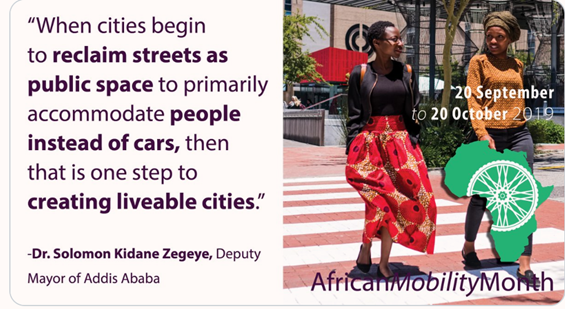This blog was written by Tu My Tran and reviewed by Blake Robinson, ICLEI World Secretariat
All trips begin or end with walking. In many cities around the world, congestion and pollution have reached a tipping point, space is limited, and the use of private cars to move is not efficient. Despite this, most mobility-related investments focus on new roads and highways catering for motorized transport rather than improving walking and cycling infrastructure which require less space and cost per commuter.
Many African cities are stuck in perpetual congestion that could be avoided by prioritizing investments to make walking, cycling, and public transport more convenient and reliable. The first-ever African Mobility Month, a social media campaign which ran from 20 September to 20 October 2019, aimed to boost and amplify the voice of the many initiatives promoting walking and cycling as clean and healthy modes of transport. By showing public demand for safe infrastructure, the campaign hoped to attract national governments’ support. Walking and cycling national policies and dedicated financial resources would enable African cities to invest in safe walking and cycling infrastructure and programs.
In many African cities, over a third of citizens move between their daily activities on foot or by bicycle. However, they face extreme risks in doing so as they often have to share the road with fast-moving trucks and cars. As cars are seen as aspirational, people who walk or cycle are often looked down upon instead of being recognized as valuable and sustainable road users. These modes are typically seen as reserved for the poor who cannot afford motorized alternatives. How can the status of clean, healthy and affordable modes of transport like walking and cycling be elevated and, why not, become part of a desirable urban lifestyle in African cities?
How to change the narrative?
A new narrative is being promoted by African initiatives like car-free days, OpenStreets, Critical Mass. During car-free days, OpenStreets, Placemaking, and similar events, roads are closed to cars and become safe public spaces for people. By experiencing what it is like to walk or cycle safely through streets without competition from vehicles, people can enjoy and envision a different use for their city’s streets. A car-free day turns into an opportunity to raise awareness on air pollution, engage communities, and promote active mobility and healthy lifestyles. In Addis Ababa, Menged Le Sew (“streets for people”) has taken place every last Sunday of the month since December 2018. Having overcome initial resistance from motorists and small business owners, the initiative is gaining popularity, and it is succeeding in providing access to sports, making people reimagine their streets, and providing a space to create healthier habits for the entire family. As a government scheme, Menged Le Sew takes place in up to 20 cities across Ethiopia, and people have started to demand weekly events in Addis Ababa.



